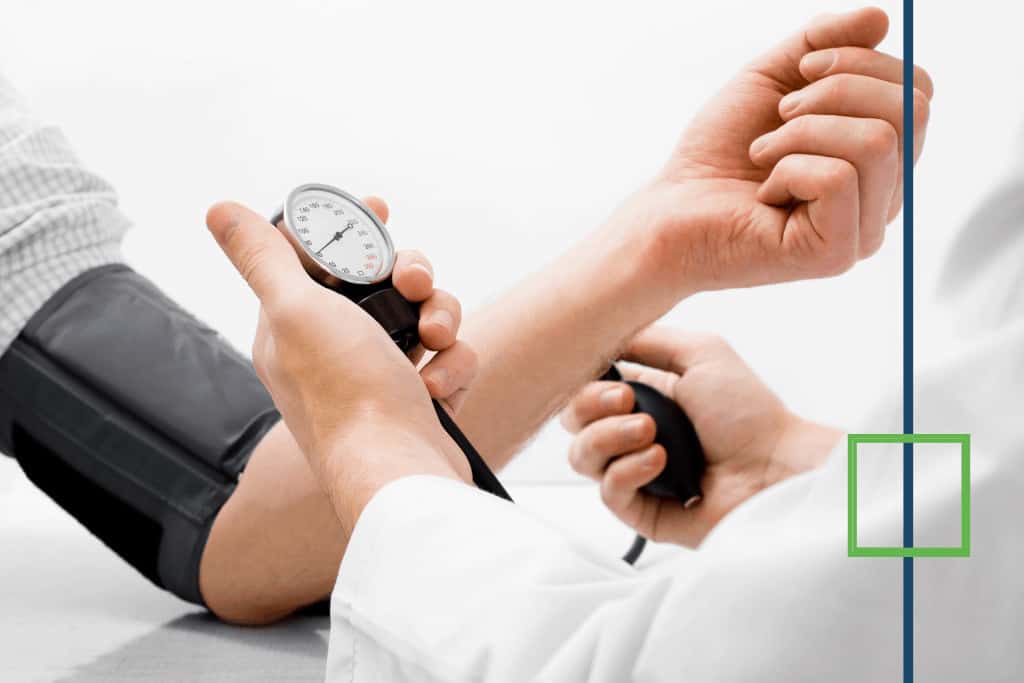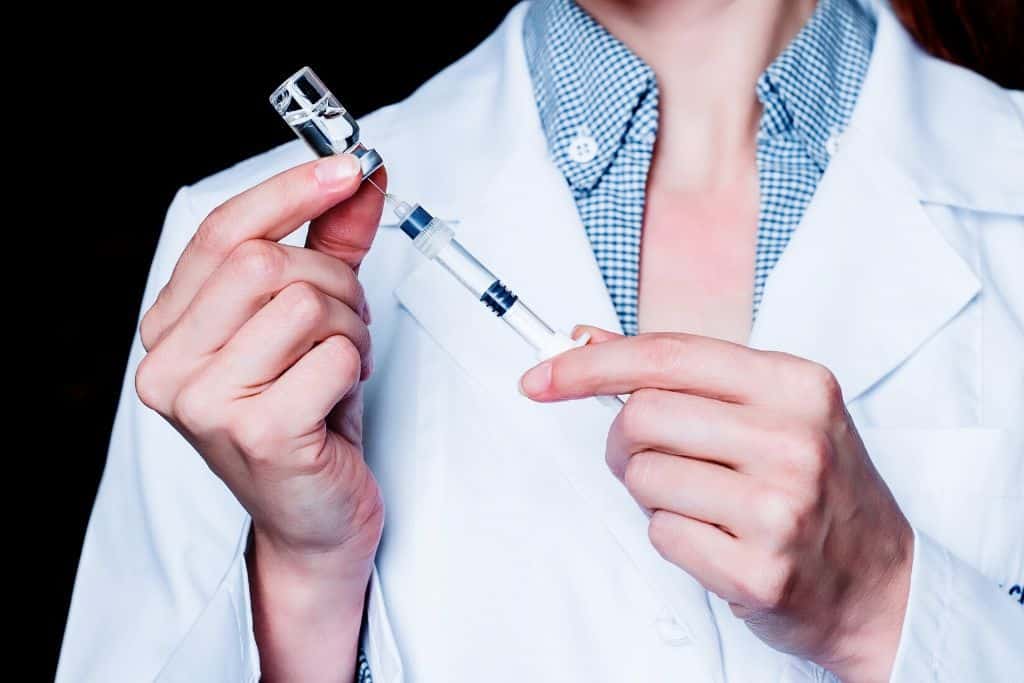What is Diabetes?
Diabetes mellitus (DM), commonly known as diabetes is a chronic (long-lasting) health condition that affects how your body turns food into energy. Most of the food you eat is broken down into sugar (also called glucose) and released into your bloodstream. When your blood sugar goes up, it signals your pancreas to release insulin. Insulin acts like a key in letting the blood sugar into your body’s cells for use as energy. Diabetes is very common. According to the National Diabetes Statistics Report 2020, 34.2 million people in the United States had diabetes in 2018. The percentage of the population with diabetes increases according to age, reaching 26.8% in adults aged 65 and older.
If a person has diabetes, the body either doesn’t make enough insulin or can’t use the insulin it makes as well as it should. When there isn’t enough insulin or cells stop responding to insulin, too much blood sugar stays in your bloodstream. Over time, that can cause serious health problems, such as heart disease, vision loss, and alcoholic kidney disease. There isn’t a cure yet for diabetes, but losing weight, eating healthy food, and being active can really help. Taking medicine as needed, getting diabetes self-management education and support, and keeping health care appointments can also reduce the impact of diabetes on your life.

Sometimes people call diabetes “a touch of sugar” or “borderline diabetes.” These terms suggest that someone doesn’t really have diabetes or has a less serious case, but every case of diabetes is serious. You are more likely to develop type 2 diabetes if you are age 45 or older, have a family history of diabetes, or are overweight. Physical inactivity, race, and certain health problems such as high blood pressure also affect your chance of developing type 2 diabetes. You are also more likely to develop type 2 diabetes if you have prediabetes or had gestational diabetes when you were pregnant. Learn more about the different types of diabetes.
What Are The Different Types of Diabetes?
Type 1 Diabetes
Type 1 diabetes is thought to be caused by an autoimmune reaction (the body attacks itself by mistake) that stops your body from making insulin. Approximately 5-10% of the people who have diabetes have type 1. Symptoms of type 1 diabetes often develop quickly. It’s usually diagnosed in children, teens, and young adults. If you have type 1 diabetes, you’ll need to take insulin every day to survive. Currently, no one knows how to prevent type 1 diabetes.
Type 2 Diabetes
With type 2 diabetes, your body doesn’t use insulin well and can’t keep blood sugar at normal levels. About 90-95% of people with diabetes have type 2. It develops over many years and is usually diagnosed in adults (but more and more in children, teens, and young adults). You may not notice any symptoms, so it’s important to get your blood sugar tested if you’re at risk. Type 2 diabetes can be prevented or delayed with healthy lifestyle changes, such as losing weight, eating healthy food, and being active.
Gestational Diabetes
Gestational diabetes develops in pregnant women who have never had diabetes. If you have gestational diabetes, your baby could be at higher risk for health problems. Gestational diabetes usually goes away after your baby is born but increases your risk for type 2 diabetes later in life. Your baby is more likely to have obesity as a child or teen, and more likely to develop type 2 diabetes later in life too.
Prediabetes
In the United States, 96 million adults—more than 1 in 3—have prediabetes. What’s more, more than 8 in 10 of them don’t know they have it. With prediabetes, blood sugar levels are higher than normal, but not high enough yet to be diagnosed as type 2 diabetes. Prediabetes raises your risk for type 2 diabetes, heart disease, and stroke. The good news is if you have prediabetes, a CDC-recognized lifestyle change program can help you take healthy steps to reverse it.
Get Help. Get Better. Get Your Life Back.
Searching for Accredited Drug and Alcohol Rehab Centers Near You?
Even if you have failed previously and relapsed, or are in the middle of a difficult crisis, we stand ready to support you. Our trusted behavioral health specialists will not give up on you. When you feel ready or just want someone to speak to about therapy alternatives to change your life call us. Even if we cannot assist you, we will lead you to wherever you can get support. There is no obligation. Call our hotline today.
(844) 597-1011Diabetes and Alcohol use
Diabetes mellitus (DM) is recognized clinically as a complication of alcoholism, and both alcoholism and diabetes affect a large population worldwide. Chronic, heavy alcohol consumption, an independent risk factor for type 2 diabetes mellitus (T2DM), disrupts the glucose homeostasis and is associated with the development of insulin resistance. However, epidemiological and controlled clinical data on the relationship between the amount of ingested alcohol and the incidence of T2DM have been inconsistent in the literature. There is a delicate balance between the harmful effects and the beneficial effects of alcohol on type 2 diabetes mellitus T2DM.

While some studies have reported that moderate and sensible alcohol use decreases the risk of T2DM or heavy alcohol use increases the risk of T2DM, with the loss of glycemic control, others have suggested that there exist no effects. Whether these effects might be due to gender differences or not, it has been shown to be inconsistent and the impact of alcohol on pre-diabetes impaired fasting glucose (IFG) or impaired glucose tolerance (IGT) has rarely been investigated.
Notably, heavy amounts of alcohol show direct diabetogenic effects with its contribution to excess caloric intake and obesity, induction of pancreatitis, disturbance of the carbohydrate and glucose metabolism, and the impairment of the liver function, which affects the blood glucose levels, which causes hypoglycemia. In T2DM patients, increased insulin resistance in key metabolic tissues, such as skeletal muscle, liver, and adipose tissue, is coupled with the reduced insulin secretion caused by impaired β-cell function in the pancreas]. The impaired response to insulin and β-cell failure in the setting of alcohol-related insulin resistance, therefore, is critical in defining the risk and development of T2DM.
Type 1 Diabetes and Alcohol
Alcohol consumption is a serious problem associated with a decline in health and high risks of premature death and disability. In individuals with type 1 diabetes, alcohol can inhibit gluconeogenesis, the formation of glucose from amino acids, and glycogenolysis, the conversion of glycogen to glucose when the glucose concentration in the blood decreases, resulting in hypoglycemia.
Type 1 diabetes is a metabolic disorder that impairs the body’s ability to use glucose in the bloodstream. Type 1 diabetes results from the destruction of pancreatic beta cells by the immune system resulting in insulin deficiency and hyperglycemia. The etiology of the disease is thought to be multifactorial, however, increased susceptibility can be attributed to genetics. ), viral exposure, ), the influence of diet in childhood, and lack of vitamin D. Classic symptoms of type 1 diabetes include polyuria, glycosuria, weight loss, and polydipsia.
Alcohol is the third highest risk factor for premature death, disability, and decline in health globally. Alcohol consumption has an inverse association with glycaemic control and hypoglycemia has become a recognized risk of alcohol consumption with 17.0% (24/141) of severe hypoglycaemic episodes induced by alcohol resulting in hospital admission for treatment.

Physiologically, alcohol has an inhibitory effect on gluconeogenesis as well as glycogenolysis in the liver. With these physiological processes blunted, the blood glucose concentrations of an individual with type 1 diabetes will fall for several hours after the intake of alcohol and, ultimately, can become life-threatening, especially in conjunction with insulin administration. There is an increased risk of hypoglycemia in the morning after alcohol consumption, which can be attributed to a reduction in growth secretion hormone during the night.
Alcohol consumption can impair an individual’s cognitive ability to self-manage their diabetes. The individual may disregard insulin administration, miscalculate their insulin doses or deprioritize blood glucose monitoring. Altered levels of consciousness resulting from alcohol intoxication may pose a more serious threat to an individual by masking an episode of hypoglycemia and delaying treatment since the individual may be unaware or unable to recognize the onset of hypoglycemia and thus not self-treat.
Alcohol and Diabetes Type 2
Light to moderate alcohol consumption seems to reduce the risk of type 2 diabetes by 30%, while heavy drinkers have the same or higher risk than total abstainers. The mechanism behind the beneficial effect of alcohol intake is probably linked to an ethanol-mediated improvement in insulin sensitivity, primarily observed in obese persons. Alcohol should preferably be enjoyed in small amounts spread out over the week since binge drinking is associated with an increased risk of type 2 diabetes.
People with a predisposition for type 2 diabetes should therefore not be discouraged from enjoying an occasional drink or two. It would however not be wise to recommend alcohol to persons at risk of type 2 diabetes, who do not drink already. It is impossible to predict those who may develop alcohol dependency and the detrimental effects of alcoholism will always outweigh the possible beneficial effects of alcohol.
Most acute studies show no increased risk of hypoglycemia in type 2 diabetic patients after alcohol intake. However, in type 2 diabetic subjects treated with a sulphonylurea, a higher risk of hypoglycemia seems to be present. This is also likely to be the case in insulin-treated subjects with type 2 diabetes. These patients should take a meal containing carbohydrate-rich food together with alcohol to diminish the risk of hypoglycemia. Type 2 diabetic subjects who have chosen to drink alcohol are by DNSG and ADA recommended not to exceed 10 g of alcohol daily for women and 20 g daily for men.
Alcohol should, however, be restricted in type 2 diabetic patients who are overweight, suffering from hypertension, or hypertriglyceridemia. Alcohol abstention is advised in patients with advanced neuropathy and erectile dysfunction and total abstention is recommended for pregnant women and people with a history of former alcohol abuse or pancreatitis.
Alcohol Interacts with Diabetes Medications
Interactions between alcohol and medication can occur in a variety of situations that differ based on the timing of alcohol and medication consumption. For example, such interactions can occur in people who consume alcohol with a meal shortly before or after taking a medication or who take pain medications after drinking to prevent a hangover. Alcohol-medication interactions fall into two general categories: pharmacokinetic and pharmacodynamic. Pharmacokinetic interactions are those in which the presence of alcohol directly interferes with the normal metabolism of the medication. This interference can take two forms, as follows:
- The breakdown and excretion of the affected medications are delayed because the medications must compete with alcohol for breakdown by cytochrome P450. This type of interaction has been described mostly for metabolic reactions involving CYP2E1, but it also may involve CYP3A4 and CYP1A2.
- The metabolism of the affected medications is accelerated because alcohol enhances the activity of medication-metabolizing cytochromes. When alcohol is not present simultaneously to compete for the cytochromes, increased cytochrome activity results in an increased elimination rate for medications that these enzymes metabolize.

Get Your Life Back
Find Hope & Recovery. Get Safe Comfortable Detox, Addiction Rehab & Dual Diagnosis High-Quality Care.
Hotline(844) 597-1011Alcohol Can Cause Hypoglycemia
Unlike with many other aspects of diabetes and diet, the immediate risk with alcohol consumption is severe hypoglycemia or dangerously low blood sugar. This can be an emergency situation. One reason for hypoglycemia with alcohol and diabetes type 2 is that alcohol can interfere with some diabetes medications, including sulfonylureas, meglitinides, and insulin. The result can be too much insulin action and a drop in blood sugar.
Another reason for hypoglycemia is that your liver is needed to metabolize alcohol, which takes its attention away from another duty: regulating blood sugar. The liver stores glycogen, a form of carbohydrate, and releases it to maintain blood sugar levels if they drop too much between meals. This mechanism is interrupted when you drink, and blood sugar can fall.
Hypoglycemia can also occur within 1 to 3 hours after drinking if you chose sugary mixed drinks or ate high-carbohydrate foods while drinking. This is known as reactive hypoglycemia because it happens as your body reacts to the sugar and other carbs by releasing more insulin.
Signs of hypoglycemia include shakiness, anxiety, confusion, dizziness, fatigue, and nausea. Headaches and seizures are also possible. A diabetic coma could result. Check your blood sugar if you have any of these symptoms. If you are unable to check your levels, treat it as though you know that you have hypoglycemia.
- Do not drink any more alcohol.
- If you have mild hypoglycemia with blood sugar 55-70 mg/dl, have 15 grams of carbohydrates and recheck your blood sugar in 15 minutes. Repeat until your number is higher than 70.
- If you have severe hypoglycemia with blood sugar less than 54 mg/dl, you may need to use injectable glucagon. You can get a prescription for this and carry it on your body. Let others know how to use it so they can administer it in case you are unconscious due to hypoglycemia.

Diabetes and Alcohol Consumption
Individuals with diabetes should be especially cautious when it comes to alcohol consumption because alcohol can make some of the complications of diabetes worse. First of all, drinking alcohol affects the liver in doing its job of controlling blood sugar. Alcohol can also interact with some medications that are prescribed to individuals with diabetes. Even if you only rarely drink alcohol, talk with your healthcare provider about it so that he or she knows which medications are best for you.
Alcohol interacts with diabetes medications
- Alcohol consumption can cause blood glucose levels to rise or fall, depending on how much you drink. Some diabetes pills (including meglitinides and sulfonylureas) also lower blood glucose levels by stimulating the pancreas to make more insulin. Combining the blood-sugar-lowering effects of the medication with alcohol can lead to hypoglycemia or “insulin shock,” which is a medical emergency.
Alcohol prevents your liver from doing its job
- The main function of your liver is to store glycogen, which is then stored form of glucose so that you will have a source of glucose when you haven’t eaten. When you drink alcohol, your liver has to work to remove it from your blood instead of working to regulate blood sugar or blood glucose. For this reason, you should never drink alcohol when your blood glucose is already low.
Never drink alcohol on an empty stomach
- Food slows down the rate at which alcohol is absorbed into the bloodstream. Be sure to eat a meal or snack containing carbohydrates if you are going to drink alcohol.
Always test blood sugar before having an alcoholic beverage
- Alcohol impairs your liver’s ability to produce glucose, so be sure to know your blood glucose number before you drink an alcoholic beverage.
Alcohol can cause hypoglycemia
- Within a few minutes of drinking alcohol, and for up to 12 hours afterward, alcohol can cause your blood glucose level to drop. After consuming alcohol, always check your blood glucose level to make sure it is in the safe zone. If your blood glucose is low, eat a snack to bring it up.
You can save your life by drinking slowly
- Drinking too much alcohol can make you feel dizzy, sleepy, and disoriented—the same symptoms as hypoglycemia. Be sure to wear a bracelet that alerts people around you to the fact that you have diabetes so that if you start to behave like you are intoxicated they know that your symptoms could be caused by hypoglycemia. If you are hypoglycemic, you need food and/or glucose tablets to raise your blood glucose level.
You can save your life by knowing your limit
- Your healthcare provider will tell you how much alcohol is safe for you to drink. Depending on your health condition, that may mean no alcohol at all. In some cases, women with diabetes may have no more than one alcoholic beverage a day. Men should have no more than two.
First-class Facilities & Amenities
World-class High-Quality Addiction & Mental Health Rehabilitation Treatment
Rehab Centers TourRenowned Addiction Centers. Serene Private Facilities. Inpatient rehab programs vary.
Addiction Helpline(844) 597-1011Proven recovery success experience, backed by a Team w/ History of:
15+
Years of Unified Experience
100s
5-Star Reviews Across Our Centers
10K
Recovery Success Stories Across Our Network
- Low Patient to Therapist Ratio
- Onsite Medical Detox Center
- Comprehensive Dual-Diagnosis Treatment
- Complimentary Family & Alumni Programs
- Coaching, Recovery & Personal Development Events
Excessive Alcohol and Diabetes
Continuing to drink alcohol while struggling with diabetes can be detrimental to health. Alcohol can block the production of glucose by the liver, which can cause super low blood sugar. Symptoms of low blood sugar, or hypoglycemia, are often similar to the symptoms of alcohol consumption, making it hard to know the difference between the two issues. Both alcohol and low blood sugar can make a person have blurred vision and slurred speech, sleepy, and experience impaired cognitive abilities and coordination.
Excessive drinking can also damage the liver, which helps to filter toxins out of the body and process medications, which can then contribute to more side effects when diabetes is also present since diabetics may need to take medications to control the condition. The effects of alcohol can be unpredictable and lead to unsafe fluctuations in a person’s blood sugar that can continue for several hours after stopping drinking; this can be very dangerous for someone who struggles with diabetes and has unstable blood glucose levels already.
Alcohol Addiction and Withdrawal Treatment
There is a strong link between mental health and alcohol abuse. Individuals who struggle with mood disorders like depression and anxiety are more susceptible to developing an addiction to drugs or alcohol, often to self-medicate symptoms of their underlying mental health condition. To determine the most effective ways to alcohol addiction, it’s crucial to first get an accurate assessment of all the symptoms. When the symptoms have been evaluated by a mental health professional, it may be determined that another form of mental condition is present and needs a particular type of treatment. Very often, some combination of psychotherapy, medication, and/or lifestyle changes are effective for coping with functional.
Medically-Assisted Detox
Detox is often considered the first stage of treatment. It will help you navigate the complicated process of withdrawal, but it doesn’t address patterns of thought and behavior that contribute to drug abuse. Various treatment approaches and settings can help provide the ongoing support necessary to maintain long-term sobriety after you complete detox.
Cravings are very common during detox and can be challenging to overcome. This often leads to relapse. Constant medical care provided during inpatient treatment helps prevent relapse. Clinicians can provide necessary medication and medical expertise to lessen cravings and the effects of withdrawals.
Psychotherapy for Depression and Anxiety
Several different modalities of psychotherapy have been used in the treatment of depression including:
- Cognitive Behavioral Therapy (CBT) – is an effective treatment that involves making changes in both the patterns of negative thoughts and the behavioral routines which are affecting the daily life of the depressed person for various forms of depression.
- Dialectical Behavioral Therapy – is a comprehensive mental health and substance abuse treatment program whose ultimate goal is to aid patients in their efforts to build a life worth living. The main goal of DBT is to help a person develop what is referred to as a “clear mind.”
- Person-Centered Therapy – is a strategy that allows and encourages clients to understand and resolve their concerns in a safe, supportive environment.
- Solution Focused Therapy – is an approach interested in solutions that can be quickly implemented with a simple first step leading to further positive consequences.
Dual Diagnosis Treatment
Substance abuse and mental health disorders often co-occur. In many cases, traumatic experiences can result in a mental health disorder and substance abuse. Dual diagnosis rehabilitation treats both of these issues together. The best approach for the treatment of dual diagnosis is an integrated system. In this strategy, both the substance abuse problem and the mental disorder are treated simultaneously. Regardless of which diagnosis (mental health or substance abuse problem) came first, long-term recovery will depend largely on the treatment for both disorders done by the same team or provider.
Medication-Assisted Treatments
Medication-Assisted Treatments (MAT) for substance use disorders and mental health disorders are commonly used in conjunction with one another. This includes the use of medications and other medical procedures. During your rehab, the staff from your treatment facility will help you identify what caused your addiction and teach you skills that will help you change your behavior patterns and challenge the negative thoughts that led to your addiction. Sometimes, the pressures and problems in your life lead you to rely on substances to help you forget about them momentarily.
Individual and Group Counseling
Addiction and mental health counseling occur in both individual and group settings. One-on-one treatment sessions may address unresolved trauma, unconscious conflicts, and specific struggles, while group sessions often involve training in life skills, stress management, conflict resolution, and social connections. Group counseling also gives clients the chance to share their thoughts and experiences to develop social support, which is essential for lasting recovery. If you or someone you know is experiencing the effects of alcohol and diabetes type 2, it is crucial to intervene early. We Level Up has addiction specialists that are standing by to help.

Experience Transformative Recovery at We Level Up Treatment Centers.
See our authentic success stories. Get inspired. Get the help you deserve.
Start a New Life
Begin with a free call to an addiction & behavioral health treatment advisor. Learn more about our dual-diagnosis programs. The We Level Up Treatment Center Network delivers recovery programs that vary by each treatment facility. Call to learn more.
- Personalized Care
- Caring Accountable Staff
- World-class Amenities
- Licensed & Accredited
- Renowned w/ 100s 5-Star Reviews
We’ll Call You
Sources
[1] NDSR – https://www.cdc.gov/diabetes/pdfs/data/statistics/national-diabetes-statistics-report.pdf
[2] CDC – https://www.cdc.gov/diabetes/basics/diabetes.html
[3] NCBI – https://www.ncbi.nlm.nih.gov/pmc/articles/PMC6761899/
[4] NCBI – https://www.ncbi.nlm.nih.gov/pmc/articles/PMC3335891/
[5] NIAAA – https://pubs.niaaa.nih.gov/publications/arh23-1/40-54.pdf


